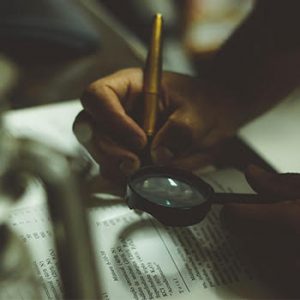DNA Testing Part 2: What To Do When You Find Out Unexpected Information
 This is BPAR's second blog in our blog series addressing DNA testing. In our first blog – What to Think About Before You Do a Test – we discussed how to prepare yourself before considering DNA testing. Today’s blog for adoptees and their families focuses primarily on how to manage unexpected DNA test results about biological family. You may remember Fred’s story about finding out he had 10 biological siblings in one weekend. His story actually started when his adoptive parents and he were joking about his ethnic heritage, and they made a bet with each other and his parents ordered him a DNA test kit. Little did he know he would be dealing with some heavy information! This is a timely topic because during the past several years, the clinicians at BPAR have noticed an increase in referrals related to surprises with genetic testing.
This is BPAR's second blog in our blog series addressing DNA testing. In our first blog – What to Think About Before You Do a Test – we discussed how to prepare yourself before considering DNA testing. Today’s blog for adoptees and their families focuses primarily on how to manage unexpected DNA test results about biological family. You may remember Fred’s story about finding out he had 10 biological siblings in one weekend. His story actually started when his adoptive parents and he were joking about his ethnic heritage, and they made a bet with each other and his parents ordered him a DNA test kit. Little did he know he would be dealing with some heavy information! This is a timely topic because during the past several years, the clinicians at BPAR have noticed an increase in referrals related to surprises with genetic testing.
DNA testing has become increasingly popular for a number of reasons. Most recent statistics indicate that approximately 12 million people have used DNA test kits. Often, the kits are given as gifts. Some people are more purposeful with testing – many adoptees are looking to learn more details about their story and early history, and any medical information or genetic links previously unavailable. We have been approached by adoptees as well as non-adopted individuals who have learned of a relative, or even a whole family tree, formed from an adoption in an era when adoptions were secretive. All members of the adoption constellation are seeking support as they process unexpected results.
In 2017, Judy Russell from the Legal Genealogist surveyed adoptees about their experiences with DNA testing during 2015 or 2016. She received 700 responses. Of these 700 responses, about a third reported that they were matched with a half first cousin or closer; over 65% were matched with a half second cousin or closer. It is important to note that, once a cousin was found and with a little digging, many adoptees were able to find other birth family members. Judy Russell states, “DNA testing helped 50% of test-takers in the study find a sibling or parent, and 34% of the time the test-taker found both biological parents! Unfortunately, about 50% are still looking for siblings or parents.”
At Boston Post Adoption Resources, have seen a wide range of scenarios after people decide to participate in DNA testing. These have included the following: learning of sperm donors and egg donors, learning of new biological siblings and/or family members, and receiving different genetic information than expected. Remember our example of Fred. Even for a healthy individual, it can be very overwhelming to learn about undiscovered living family members. It can cause intense feelings of confusion, guilt or even shame, coupled with the joy and excitement of having found birth family members.
Often individuals are excited, but also nervous and confused, and they tend to move very quickly, which can lead them to feeling even more overwhelmed. This can look like texting or emailing daily or exchanging phone numbers and pictures within days or minutes of learning about newly discovered family members. In our experience at BPAR, we have found there is not a lot of support for people as they learn about biological relatives and receive unexpected information about their genetic history. Our mission at BPAR is to provide this support, as well as education and resources which we include at the conclusion of this blog.
How to Manage Unexpected DNA Test Results
Here are some tips for how to begin to manage unexpected information resulting from a DNA test, including questions to ask yourself.
1) Slow the process down. 
Give yourself time. Getting results can be both exciting and upsetting. In the moment, literally take some deep breaths, shut down your computer or phone, and walk away. Give yourself permission to take at least one week to process information without taking any action. If, after two weeks, you are still feeling that the discovery of new information is overwhelming and taking up a lot of mental space, *seek out support to help you process these emotions (refer to #4).
2) Avoid Googling family members right away.
- Try to avoid finding newly identified family members on social media or the Internet until you have given yourself time to digest the new information. Be aware of the implications of contacting a second/half cousin, and know that the exposure of your information to a distant family member can quickly spiral into connections with more closely related relatives! This means it is important to take careful and steady steps. This applies to both the adoptee and the birth family.
- Avoid Googling medical information. If you receive unexpected medical information, talk to your doctor first instead of relying on the computer. It is suggested that even before trying to understand your genetic information, contact a genetic counselor or professional to interpret the results before assigning meaning.
- Understand the limitations of a DNA test. Neither the internet or the genetic testing kit are 100% accurate. The kit is merely a genetic summary that points out specific aspects (for example if you have the genes for breast cancer or heart diseases) but not all aspects of diseases and illnesses.
3) Review reasons and motivations for your search.
We spoke about the importance of staying in touch with your motives in our first blog. Reviewing your motivation for undergoing DNA testing can help you remember your initial goals. Were you mainly curious to discover something, or did you plan all along to use new information to take some sort of action? Getting information does not mean you have to pursue a relationship. Ask yourself: Have my goals changed?
4) *Seek out support.
Have you received any therapeutic supports to help you cope with potential difficulties your discoveries may bring up? Seeking professional guidance can help you balance your hopes with realistic expectations. It’s healthy to have fantasies and hopes, but only when we can balance our hopes with what we know to be realistic. This can help us deal with disappointments.
- Which close friends or family members can you confide in about any troubling thoughts or feelings resulting from your new discoveries
- If you are adopted, do you know any other adoptees who have gone through the genetic testing process?
5) Get educated about the pros and cons of genetic testing.
It is also very important to educate oneself of the strengths and limitations of pursuing and interpreting a genetic test result; adoptees should be aware that genetic testing is NOT 100% accurate and should not fully rely on this report to interpret and identify one's health history and potential risks for diseases, allergies and conditions. Please reference the below Adoption Advocate article (Resource #5) which differentiates between direct-to-consumer “DTC” and medical genetic testing.
6) Practice healthy boundaries for yourself.
- Listen to your gut. Think about what you need and want for yourself. It is so easy to focus on others, including any new family member(s) you have just identified, or your current family members. This tendency can be very common when family secrets are uncovered through genealogical testing. We see many people experiencing conflicted loyalty, both feeling protective of the family that they grew up with and also of their new family member(s).
- Practice modeling good boundaries. This can include setting limits regarding the amount of contact with new family members, and reviewing what you want to share versus what you want to keep private.
- Be clear if you contact newly identified family. If you decide to contact identified family members, be clear and concrete about your goals when and if you make the first contact. NPE Friends suggests a letter that asks for family medical information and makes it clear that the writer is not seeking money. They suggest sending photos, ideally of yourself as a toddler, a teen and as an adult. Many of you may have read the article in the Boston Globe which highlights the possibility of negative assumptions about your intentions when contacting newly identified family.
- Empower yourself. Give yourself choices. It’s okay to change your mind. Listen to your instincts every step of the way.
- Consider private profiles. There are options on many DNA sites to opt out of finding genetic matches. Carefully read the privacy and confidentiality questions and contracts (if provided) as the fine print might reveal surprises about a customer’s privacy that aren’t clear otherwise.
Here are some resources we’ve heard about:
1) https://thednageek.com/getting-started-in-an-unknown-parentage-search/
-Outlines different companies, options for birth family searches, Facebook support groups.
2) http://www.dnaadoption.com/index.php?page=adoption-specific-information
-For Adoptees: Guide to consider re: request information before doing testing.
3) https://www.npefellowship.org/what-we-do/
-Nonprofit formed for individuals who learn of “non-parental events” or unexpected information about biological parents.
4) https://www.theatlantic.com/science/archive/2018/07/dna-test-misattributed-paternity/562928/
-Personal stories, private facebook group.
5) http://www.adoptioncouncil.org/publications/2017/10/adoption-advocate-no-112
Adoption Advocate Article: Explains difference between DTC (direct-t0-consumer) and genetic medical testing.
6) https://thegeneticgenealogist.com/2017/01/08/adoptee-testing-a-study/)
Remember, take care of yourself first this holiday season!
Written by KC, Kelly, Erica, Michelle and the BPAR Team